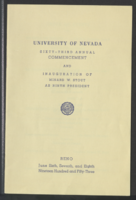Search the Special Collections and Archives Portal
Search Results

Transcript of interview with Stan Irwin by Cork Proctor, October 24, 2003
Date
Archival Collection
Description
Stan Irwin shares details of his background, family, and early show business experiences. His life story spans many decades and includes attending NYU, doing stand-up comedy, flying during WWII, working at Club Bingo in Las Vegas, and building up the entertainment at the Sahara Hotel. Mr. Irwin comments on many aspects of the Las Vegas entertainment scene. He recalls many headliners that he worked with and shares anecdotes about several. The Beatles, Johnny Carson, Dinah Washington, Billie Holliday, Lena Home, and Pearl Bailey are just a few of the many outstanding performers that he brought to Las Vegas. Stan offers comments on racism in Las Vegas thirty and forty years ago, and gives his opinions on the Mob, Howard Hughes, prostitution, and dress codes in the fifties and sixties, among other things. He recalls how Las Vegas looked in the early days, mentions a cardiovascular health project for children that he's involved with today, and gives a little insight into staying fit at eighty-plus.
Text

Transcript of interview with Eleazar "Al" Martinez by Marcela Rodriguez-Campo, October 2, 2018
Date
Archival Collection
Description
In his lifetime, Eleazar Martinez has climbed both literal and figurative mountains as an avid outdoorsman and social justice advocate for Latinx issues. Born in Sweetwater, Texas, Eleazar (Al for short) grew up connected to the land and his family. Al comes from a large family with strong ties in Texas and Mexico. His mother worked the fields and his father was a construction worker who instilled in their children the importance of a strong work ethic and the pursuit of an education. Al shares about growing up during a time when Spanish was banned from schools and children would get punished if they were caught using their home languages. His experiences developed his aspiration to serve his community and fight for people’s rights. After a short stint in the Navy, Al followed his instincts and sought out a college education and majored in sociology. His interest in social issues lead him to serve in a range of roles from psychiatric support, community education outreach, and counseling. At one point, Al even helped mediate tensions between gangs and law enforcement in order to prevent violence from erupting. Since arriving in Las Vegas in 1998, Al has been working alongside diverse communities to build solidarity. Today, he works as a supervisor for the Whitney Recreation Center and leader in Hispanics Enjoying Camping, Hunting, and the Outdoors (HECHO). As Al would describe himself, he is “a proud Mexican Latino American, a Tejano with a Chicano attitude”.
Text

Transcript of interview with Daniel Kaminski by Brian Corcoran, March 14, 1978
Date
Archival Collection
Description
On March 14, 1978, Brian Corcoran interviewed Twenty-One dealer Daniel Kaminski (born November 17th, 1947 in New Jersey) about his life in Southern Nevada. The two discuss Kaminski’s occupational history and gambling practices amongst tourists. They then go in depth on the rise of gambling establishments across the United States and the impacts it may have on Las Vegas. The interview concludes with a discussion on the role of dealers in casinos.
Text

Transcript of interview with Mike and Susan Baller by Barbara Tabach, March 16, 2016
Date
Archival Collection
Description
In this interview, Mike and Susan Baller reflect upon their lives in Las Vegas, from growing up as teenagers amongst the tight-knit Jewish community, to mob influence on the city, and the impact of the city's growth. Mike shares stories about first arriving in Las Vegas to live, being a teenaged busboy at Binions Horseshoe to being related to Moe Dalitz -- in Michigan Mike drove a truck for the Dalitz dry cleaning business.
Text

Transcript of interview with Lori Chenin-Frankl by Barbara Tabach, June 7, 2016
Date
Archival Collection
Description
Lori provides a wonderful narrative of her Judaism, her love of teaching children and her devotion to family and music. She talks about growing up in Las Vegas and becoming a bat mitzvah, a rarity for girls in 1973. Throughout her life, including the period where she moved around with her Air Force husband, she sought Jewish connections to help her feel at home no matter where she was.
Text

Interview with Lafayette "Lafe" H. Dana, June 20, 2005
Date
Archival Collection
Description
Text

Interview with Corbin Harney, August 4, 2005
Date
Archival Collection
Description
Text

University of Nevada (Reno) 63rd commencement program
Date
Archival Collection
Description
Commencement program from University of Nevada, Las Vegas Commencement Programs and Graduation Lists (UA-00115).
Text
Edward G. Halligan Photograph Collection on the Nevada Test Site
Identifier
Abstract
The Edward G. Halligan Photograph Collection on the Nevada Test Site contains photographs of nuclear detonations at the Nevada Test Site from the 1960s. The photographs primarily depict aboveground nuclear explosions, but they also contain photographs of facilities, machinery, and personnel at the Nevada Test Site.
Archival Collection
Eileen Brookman Photographs
Identifier
Abstract
The Eileen Brookman Photographs depict Nevada Assemblywoman Eileen Brookman from 1959 to 1989. The photographs primarily depict Brookman with other Nevada politicians, including U.S. Senators Harry Reid, Alan Bible, Eugene McCarty, and Howard Cannon, and Nevada Governors Paul Laxalt, Mike O’Callaghan, Richard Bryan, and Grant Sawyer. The photographs also depict Brookman at political events with the Nevada National Guard, bill-signing ceremonies, and at events in Las Vegas, Nevada.
Archival Collection
